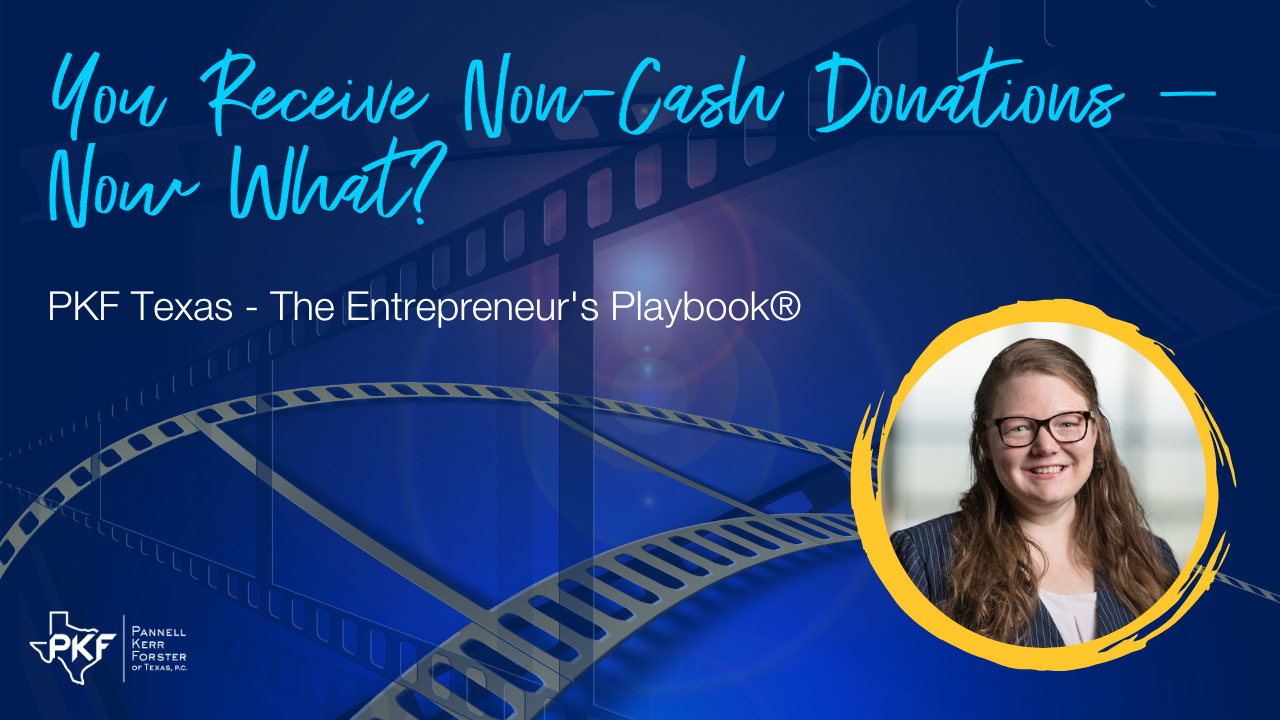Your Receive Non-Cash Donations – Now What?

Donations to a not-for-profit organization can be gifted in various ways – it’s not always cash. So, what does your organization need to do if non-cash items are donated? There are some things to consider. In this episode of PKF Texas – The Entrepreneur’s Playbook®, Tax Director Emily Smikal, CPA, provides guidance on what the necessary steps are.
Jen: This is the PKF Texas – Entrepreneur’s Playbook®. I’m Jen Lemanski and I’m back once again with Emily Smikal, one of our Approachable Advisors™ and the tax lead of our not-for-profit practice. Emily, welcome back to the Playbook.
Emily: Hey, thanks for having me.
Jen: So, we’ve talked all sorts of things not-for-profit, and we know that not-for-profits love cash, money, financial donations. But there’s sometimes where folks want to give other things, non-cash, property, art, all sorts of things. What do charities do with those non-cash donation items? How does that impact them?
Emily: Sure. Well, as you mentioned, a lot of times cash is king for the receiving organization, but there are some additional tax benefits for a donor to donate appreciated property. And because of the attractiveness of that to donors, it’s really prudent for a not-for-profit organization to understand the donor implications of that, as well as be prepared to accept such a donation of non-cash items.
Jen: What types of things should they have in place in order to accept those non-cash items?
Emily: Yeah, well I won’t get too far into the weeds on that on this video because we have done another video on what steps to take in that instance to be prepared. But an organization absolutely should have a gift acceptance policy in place that stipulates the types of gifts they’re willing to accept, what they’ll do with those gifts, etc.
Jen: So why would somebody want to give a non-cash item as opposed to just, “Here you go! Here’s some money?”
Emily: Well, I mean, besides the obvious answer, that’s what they have on hand. There are actually some serious tax advantages to donors if they choose to donate some certain types of non-cash items. For example, if they want to donate appreciated stock, there’s a double tax benefit to them in that instance. One, they get to take the tax deduction for the higher fair market value rather than their lower basis in the item. And two, they don’t have to pay capital gains tax on that difference, that appreciation. So, it’s quite an attractive option for them.
Jen: Interesting. So, that’s definitely something that they should speak to their tax advisor about before even making that donation to the not-for-profit potentially.
Emily: Absolutely. A donor should definitely consult their tax advisor on these items, and also there could be the similar benefit in maybe if they want to donate appreciated artwork. That could vary depending on how the organization is going to use the artwork. It could also benefit them to donate, appreciate a real estate. There’s some caveats there on whether there’s a mortgage attached to it or if the organization’s going to end up selling that land. When and to whom they’re going to sell it. There’s some caveats, but the benefit could definitely be there for them.
Jen: Is it worth it to the not-for-profit organization to make some of those non-cash things that they would like to receive known or public to some of their bigger donors? Like, “Hey, if you happen to have X, Y, Z, feel free.”
Emily: Sure. We see sometimes an organizations vehicle. They make that known, it’s more likely that they’re going to get it; ask and you shall receive type thing. So, if they’ve got that policy in place that stipulates what they’re willing to accept, then they can play off of that to lay it out of what they may need.
Jen: Perfect. Sounds good. I think we’ll get you back to talk about some more not-for-profit topics. Sound good?
Emily: Sounds great.
Jen: Great. This has been another thought leadership production brought to you by PKF Texas – The Entrepreneur’s Playbook®. For more information about this and other not-for-profit topics, visit www.pkftexas.com/Insights. Tune in next week for another chapter.

